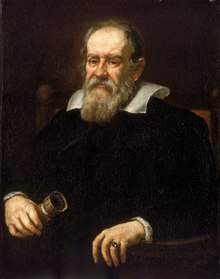Facts for Kids
Galileo Galilei was an Italian astronomer, physicist, and mathematician who played a pivotal role in the Scientific Revolution and is known for his contributions to the scientific method and astronomy.
Overview
Cultural Impact
Inquisition And Trial
Later Life And Legacy
Innovations In Physics
Recognition And Honors
Early Life And Education
Contributions To Astronomy
Influence On Scientific Method

Inside this Article
The Leaning Tower Of Pisa
Isaac Newton
Renaissance
Spacecraft
Literature
Mountains
Astronomy
Florence
Universe
Did you know?
🔭 Galileo is often referred to as the 'Father of Modern Science' because of his pioneering methods.
🌌 He was one of the first to use a telescope for astronomical observations.
🌍 Galileo supported the Copernican theory that the Earth revolves around the Sun.
⚖️ He famously conducted experiments that laid the groundwork for classical physics.
🛠️ Galileo invented the thermoscope, an early device to measure temperature.
📜 He faced the Roman Inquisition for his support of heliocentrism.
🎓 Galileo made significant contributions to the study of motion and inertia.
🌕 His observations of the moons of Jupiter provided evidence for heliocentrism.
📝 He wrote several influential works, including 'Dialogue Concerning the Two Chief World Systems.'
🕵️♂️ Galileo emphasized the importance of observation and experimentation in science.
Introduction
Cultural Impact
Inquisition And Trial
Later Life And Legacy
Innovations In Physics
Galileo's belief in using observation and experimentation changed how we learn about the physical world.
Recognition And Honors
Early Life And Education
He lived during the Renaissance, a wonderful time when many new ideas and discoveries were happening. This helped him become a great thinker!

